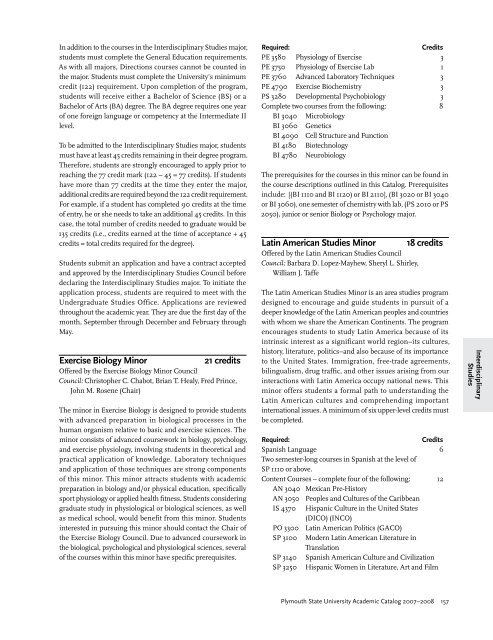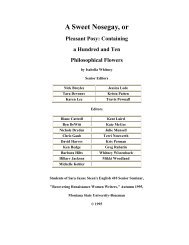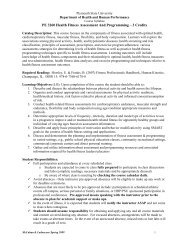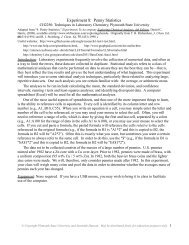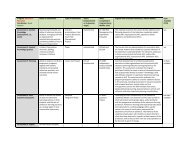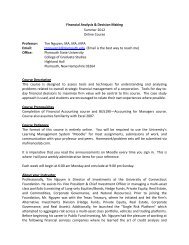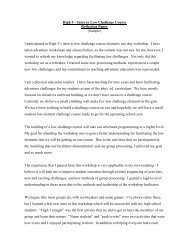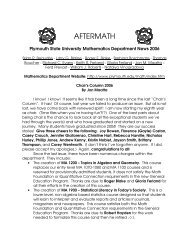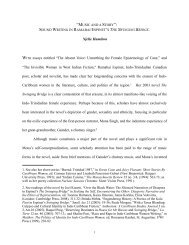2007-2008 Undergraduate Academic Catalog - Plymouth State ...
2007-2008 Undergraduate Academic Catalog - Plymouth State ...
2007-2008 Undergraduate Academic Catalog - Plymouth State ...
- No tags were found...
You also want an ePaper? Increase the reach of your titles
YUMPU automatically turns print PDFs into web optimized ePapers that Google loves.
In addition to the courses in the Interdisciplinary Studies major,students must complete the General Education requirements.As with all majors, Directions courses cannot be counted inthe major. Students must complete the University’s minimumcredit (122) requirement. Upon completion of the program,students will receive either a Bachelor of Science (BS) or aBachelor of Arts (BA) degree. The BA degree requires one yearof one foreign language or competency at the Intermediate IIlevel.To be admitted to the Interdisciplinary Studies major, studentsmust have at least 45 credits remaining in their degree program.Therefore, students are strongly encouraged to apply prior toreaching the 77 credit mark (122 – 45 = 77 credits). If studentshave more than 77 credits at the time they enter the major,additional credits are required beyond the 122 credit requirement.For example, if a student has completed 90 credits at the timeof entry, he or she needs to take an additional 45 credits. In thiscase, the total number of credits needed to graduate would be135 credits (i.e., credits earned at the time of acceptance + 45credits = total credits required for the degree).Students submit an application and have a contract acceptedand approved by the Interdisciplinary Studies Council beforedeclaring the Interdisciplinary Studies major. To initiate theapplication process, students are required to meet with the<strong>Undergraduate</strong> Studies Office. Applications are reviewedthroughout the academic year. They are due the first day of themonth, September through December and February throughMay.Exercise Biology Minor21 creditsOffered by the Exercise Biology Minor CouncilCouncil: Christopher C. Chabot, Brian T. Healy, Fred Prince,John M. Rosene (Chair)The minor in Exercise Biology is designed to provide studentswith advanced preparation in biological processes in thehuman organism relative to basic and exercise sciences. Theminor consists of advanced coursework in biology, psychology,and exercise physiology, involving students in theoretical andpractical application of knowledge. Laboratory techniquesand application of those techniques are strong componentsof this minor. This minor attracts students with academicpreparation in biology and/or physical education, specificallysport physiology or applied health fitness. Students consideringgraduate study in physiological or biological sciences, as wellas medical school, would benefit from this minor. Studentsinterested in pursuing this minor should contact the Chair ofthe Exercise Biology Council. Due to advanced coursework inthe biological, psychological and physiological sciences, severalof the courses within this minor have specific prerequisites.Required:CreditsPE 3580 Physiology of Exercise 3PE 3750 Physiology of Exercise Lab 1PE 3760 Advanced Laboratory Techniques 3PE 4790 Exercise Biochemistry 3PS 3280 Developmental Psychobiology 3Complete two courses from the following: 8BI 3040 MicrobiologyBI 3060 GeneticsBI 4090 Cell Structure and FunctionBI 4180 BiotechnologyBI 4780 NeurobiologyThe prerequisites for the courses in this minor can be found inthe course descriptions outlined in this <strong>Catalog</strong>. Prerequisitesinclude: [(BI 1110 and BI 1120) or BI 2110], (BI 3020 or BI 3040or BI 3060), one semester of chemistry with lab, (PS 2010 or PS2050), junior or senior Biology or Psychology major.Latin American Studies MinorOffered by the Latin American Studies CouncilCouncil: Barbara D. Lopez-Mayhew, Sheryl L. Shirley,William J. Taffe18 creditsThe Latin American Studies Minor is an area studies programdesigned to encourage and guide students in pursuit of adeeper knowledge of the Latin American peoples and countrieswith whom we share the American Continents. The programencourages students to study Latin America because of itsintrinsic interest as a significant world region–its cultures,history, literature, politics–and also because of its importanceto the United <strong>State</strong>s. Immigration, free-trade agreements,bilingualism, drug traffic, and other issues arising from ourinteractions with Latin America occupy national news. Thisminor offers students a formal path to understanding theLatin American cultures and comprehending importantinternational issues. A minimum of six upper-level credits mustbe completed.Required:CreditsSpanish Language 6Two semester-long courses in Spanish at the level ofSP 1110 or above.Content Courses – complete four of the following: 12AN 3040 Mexican Pre-HistoryAN 3050 Peoples and Cultures of the CaribbeanIS 4370 Hispanic Culture in the United <strong>State</strong>s(DICO) (INCO)PO 3300 Latin American Politics (GACO)SP 3100 Modern Latin American Literature intranslationSP 3140 Spanish American Culture and CivilizationSP 3250 Hispanic Women in Literature, Art and FilmInterdisciplinaryStudies<strong>Plymouth</strong> <strong>State</strong> University <strong>Academic</strong> <strong>Catalog</strong> <strong>2007</strong>–<strong>2008</strong> 157


